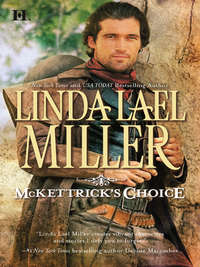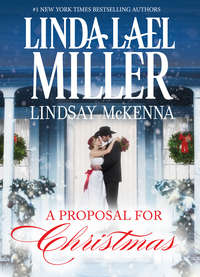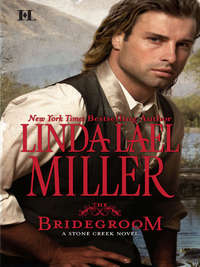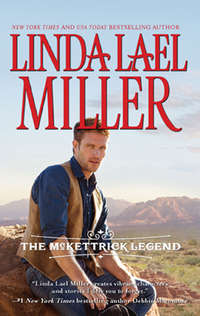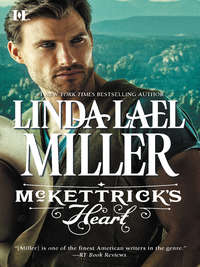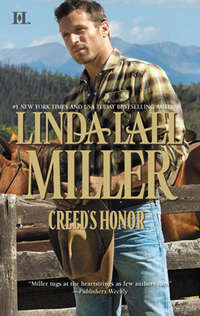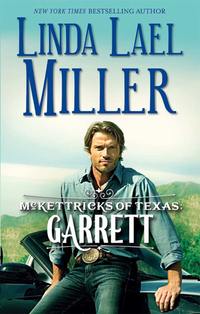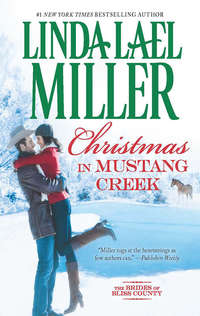
Полная версия
Cowboy Ever After: Big Sky Mountain
Maggie collected her handbag from a drawer of her desk. “Then let’s go and do the walk-through,” she said. “Then we’ll come back here and take another shot at running the numbers for Madison’s fund.”
“I’d like that,” Kendra said, feeling almost giddy.
“Follow me, then,” Maggie said, jangling her car keys.
The cottage had been freshly painted, Kendra noticed with a pang of sweet avarice, and so had the picket fence out front. The flower beds were in full bloom and the lawn, newly mown, smelled sweetly of cut grass.
It was so easy to imagine herself and Madison living here.
“I knew you were selling the mansion, of course,” Maggie said when they got out of their cars and met on the sidewalk in front of the colonial. “But I guess I thought you’d be in the market to buy a place, rather than rent.”
“I did plan on buying,” Kendra answered, letting her gaze wander over the sleeping-in-the-sunshine face of that perfect little house, “but I’m learning that it’s wise to be open to surprises.”
Maggie smiled and opened the creaky gate. “Isn’t that the truth?” she responded.
CHAPTER FOUR
WHEN HUTCH FINALLY caught up with Brylee, she was in her small but well-organized warehouse on the outskirts of Three Trees, helping to stack boxes as they were unloaded from the back of a delivery truck.
Clad in jeans, sneakers and a blue U of M pullover, she looked more like a teenager than a thirty-year-old woman with a successful business and a bad-luck wedding day to her credit. Her russet-brown hair hung down her back in a long, fairly tidy braid, and she hadn’t bothered with makeup.
She didn’t notice Hutch right away and he used those moments to gather his resolve, all the while wishing he felt something for Brylee—God knew, she was beautiful and she was sweet and she was smart. She was definitely wife and mother material—but she didn’t stir him down deep where it counted and that was a deal-breaker.
At last Brylee stilled, like a doe catching the scent of some threat on the wind, she turned her head his way and saw him standing just a few feet inside the roll-up doorway of the warehouse,
Her large eyes, bluish today because of the color of the shirt she was wearing, looked hollow as she took him in and he knew she was weighing her options—seriously considering walking away without deigning to speak, if not shooting him down where he stood or running him over with the first handy forklift.
Brylee had a temper and she could be as hardheaded as any statue, but she was no coward. She spoke sotto voce to the other workers, all female, all of whom were staring now, as though Hannibal Lector had just appeared in their midst, wearing the leather mask and holding a plate of fava beans, and then came slowly toward him.
Brylee ran a small but thriving party-planning company that sold home decor items and various gifts. She had a network of sales people that covered a five-state area, holding lucrative little gatherings in people’s homes, and operated a thriving online store, as well.
“Hello, Hutch,” she said, indicating her nearby office with a nod and leading the way.
He fell into step with her after muttering a gruff “hello” of his own.
The office was small and furnished in early army surplus. Brylee evidently reserved her creative capacities for choosing and photographing products, training her “independent home decor consultants” and coming up with innovative marketing strategies. Here, in this little room off the warehouse, she handled the practical end of things.
“I wondered when you’d show up,” she said once they were inside her enclave with the door closed against listening ears.
“I wanted to come and see you right after the—well, after—but I was persuaded that it wouldn’t be a good idea,” Hutch replied. He stood with his back to the door, while Brylee perched on the edge of her beat-up steel desk, with her arms folded and her head tipped to one side in skeptical anticipation.
“I could have spared you the trouble of paying a visit,” Brylee replied quietly. She looked strained, exhausted, a little pale, but pride flashed in her changeable hazel eyes and stiffened her generous mouth. “I don’t have anything to say to you, Hutch. Nothing I’d want written in the Book of Life, anyway.”
“Well,” he drawled, after stifling a wry chuckle, “it just so happens that I have something to say to you.”
Brylee arched one eyebrow and waited. She looked bored now, but wary, too. What, she might have been wondering, was this yahoo going to spring on her now?
Hutch shoved a hand through his hair. He’d left his hat in the truck, but otherwise he was dressed as usual in work clothes and boots. Whisper Creek Ranch practically ran itself these days, well-staffed and well-organized as it was, but he still felt the need to get up every morning before the sun rose and tend to the business of herding cattle, mending fences and all the rest.
Today he hadn’t been able to keep his mind on the routine, though, and it was a damn confusing situation, too. He thought about Kendra 24/7, but he’d been drawn to Brylee ever since that broken-road wedding that didn’t quite come off.
“I can’t say I’m sorry for what I did,” he said straightforwardly. “Going through with that ceremony would have been the mistake of a lifetime—for both of us.”
“Yes, you made that pretty clear,” Brylee answered, her tone terse. “Is that what you drove all the way from Whisper Creek to tell me?”
“No,” Hutch said, standing his ground. “I came to say that you’ll find the right man, no matter what you think now, and when you do, you’ll be damn glad you didn’t marry me and wreck your chances to be happy.”
“Maybe I’m already ‘damn glad I didn’t marry you,’” Brylee reasoned tartly. “Did you ever consider that possibility?”
He grinned. “That one did occur to me, believe it or not,” he said. “I should have made you listen to me, Brylee, before things went as far as they did.”
“That was my grandmother’s dress I was wearing,” she said, after a short pause. “It had to be restored and altered and specially cleaned. I spent a fortune on the cake and the invitations and the flowers and all the rest. It’s going to take weeks, even with help from my friends, to send back all those wedding gifts.” Her shoulders moved in the ghost of a shrug. “But, hey, what the heck? You win some, you lose some. And besides, who needs six toaster ovens anyhow?”
Tears brimmed in her eyes and she looked away, fiercely dignified.
“Brylee,” Hutch said, not daring to touch her or even take a step in her direction. “I know you’re hurt. I’m sorry about that—sorrier than I’ve ever been about anything in my life. And I’m more than ready to reimburse you for any of the costs—”
“I don’t want your money!” she flared suddenly, looking straight at him now, with fire flashing behind the pride and sorrow in her eyes. “This was never about money—I have plenty of my own, in case you haven’t noticed.”
“I know that, Brylee,” he said gently.
“Then what did you expect to accomplish by coming here?” She held up an index finger. “Wait, let me answer for you,” she added. “Your conscience is bothering you—what passes for a conscience with you—and you want me to say all is forgiven and we can be friends and go on as if nothing happened.” With that, Brylee slipped past him and jerked the office door open wide. “Well, you can just go to hell, Hutch Carmody, and take your lame apologies with you.” A sharp, indrawn breath. “Get out.”
“You might want to try listening to what’s really being said to you, Brylee, instead of just the parts you want to hear,” he told her calmly, not moving. “It would save a lot of wear and tear on you and everybody else.”
“Get. Out.” Brylee parsed the words out. “Now.”
He spread his hands in an “I give up” gesture and ambled past her, across the warehouse, which was as still as a mausoleum, and out through the doorway into the sunshine.
Walker Parrish, Brylee’s brother, had just driven up in a big, extended-cab pickup with his stock company logo painted on the doors. He raised rodeo stock on his ranch outside of Three Trees, where he and Brylee had grown up.
Hutch stopped. He frankly wasn’t in the mood for any more yammer and recrimination, but he wouldn’t have it said that he’d tucked his tail and run from Walker or anybody else.
“We-e-e-l-ll,” Walker said, dragging out the word. “If it isn’t the runaway bridegroom.”
Hutch wasn’t about to give an inch. “No autographs, please,” he retorted dryly. He wasn’t looking for a fight, but if Walker wanted one, he’d come to the right man.
Walker chuckled and shook his head. Hutch knew women found Brylee’s big brother attractive, with his lean but wide-shouldered build and his rugged features, but so far he’d managed to steer clear of marriage, which should have made him at least a little sympathetic to Hutch’s side of the story, and clearly hadn’t.
“I can’t imagine what you’re doing on my sister’s property right now,” Walker observed, his water-gray eyes narrowed as he studied Hutch.
Hutch took his time shaping a reply. “I felt a need to offer an apology,” he finally said, his tone level, even affable. “She wasn’t in the frame of mind to accept it.”
“I don’t reckon she would be,” Walker said. “Far as I’m concerned, Brylee always was half again too good for you, and in the long run you probably did her a favor by calling off the wedding. None of which means I wouldn’t like to smash your face in for putting her through all that.”
While Hutch privately agreed with much of what Walker had just said, he wasn’t inclined to explain his repeated attempts to put the brakes on before he and Brylee and half the town ended up in the church on that fateful Saturday afternoon. And he’d come to Three Trees to apologize to Brylee, not her brother.
“If you want a fight, Walker,” he said, “I’ll give you one.”
Walker appeared to consider the pros and cons of getting it on right there in the warehouse parking lot. In the end, though, he shook his head. “What goes around, comes around,” he finally said. “You’ll get what’s coming to you.” Then, as an apparent afterthought, he added, “You planning on entering the rodeo this year?”
“Don’t I always?” Hutch answered, mindful that Walker provided the bulls and broncos for such events all over the West, including the one in Parable. He was well-known for breeding almost unrideable critters.
Walker grinned. “Here’s hoping you draw the bull I have in mind for you,” he said. “He’s a real rib-stomper.”
“Bring him on,” Hutch replied, grinning back.
With that, the two men, having said their pieces, went their separate ways—Hutch heading for his truck, Walker going on into the warehouse.
Behind the wheel of his pickup, Hutch ground the key into the ignition.
He didn’t know what he’d expected of this first post-disaster encounter with Brylee, but he’d hoped they could at least begin the process of burying the hatchet.
After all, neither of them were going anywhere.
Parable and Three Trees were only thirty miles apart, and the two communities were closely linked. In other words, they’d see each other all the time.
He sighed and drove away. Maybe there was something to Brylee’s accusation that, in coming on this fool’s errand, he’d been more interested in soothing his own conscience than making any kind of amends, but at least he’d tried—again—to set things right, so they could at least be civil to each other.
He figured it was probably too soon and wondered if the anti-Hutch internet campaign would ramp up a notch or two, since several of the key players—Brylee’s friends and employees—had basically witnessed the confrontation.
These days everybody was an ace reporter.
“Well, cowboy man,” he muttered to himself, “you’re batting a thousand. Might as well go for broke.”
Reaching the highway, he rolled on toward Parable.
And Kendra.
* * *
MADISON WAS THRILLED with the new house when Kendra sprang the surprise on the little girl after picking her up at preschool that afternoon, and Daisy was thrilled with the spacious backyard.
The small colonial boasted two quite spacious bedrooms, plus a little cubicle Kendra planned to use as a home office, and two full baths. The kitchen was sunny, with plenty of cupboard space and a small pantry, and there was a large, old-fashioned brick fireplace in the living room. Closer inspection revealed small hooks in the wooden mantel for hanging Christmas stockings.
All in all, the place was perfect—except, of course, for being a rental and therefore impermanent. Kendra had asked Maggie about buying the house, but Maggie was understandably reluctant to sell. She said it would be like putting a price on her childhood, and she couldn’t do that.
“This is my room!” Madison exulted now, standing in the center of the space with window seats and built-in bookshelves and shiny plank floors worn to a warmly aged patina. The folding closet doors were louvered, and the overhead light fixture was small but ornate.
Daisy gave a single joyous bark, as though seconding Madison’s motion and making a claim of her own.
Kendra laughed. “Yes,” she said to both of them. “This is your room.”
“Am I going to have a bed?” Madison inquired matter-of-factly.
“Of course,” Kendra replied. “We’ll visit the furniture store over in Three Trees and you can pick it out yourself.”
The town of Three Trees was actually smaller than Parable by a couple of thousand people, but it boasted a large outlet mall that drew customers from all over that part of the state, along with a movie house, a large bookstore and a Main Street lined with shops.
“Can we go now?” Madison asked.
“I don’t see why not,” Kendra replied. Her gaze fell on Daisy. Shopping for furniture with a puppy in tow didn’t mesh.
The next question was inevitable, not to be forestalled. “Can Daisy come with us?” Madison wanted to know.
Sadly, Kendra shook her head. “That won’t work, sweetie. But she’ll be fine at the guesthouse, I promise.”
Madison mulled that over, then her face brightened again. “All right,” she said. “Daisy must be tired from playing with Lucy all day. She can take a nap while we’re gone.”
“Good thinking,” Kendra said, holding out a hand to her daughter. “Let’s get going.”
Daisy was remarkably cooperative when they got back to the guest cottage. She lapped up half the water in her bowl, munched on some kibble, went outside with Madison to take care of dog business and returned to settle on her soft bed in the kitchen, yawning big.
Kendra’s heart swelled into her throat as Madison crouched next to the puppy, patting its head gently and whispering, “Don’t be scared, okay? Because Mommy and I will be back before it gets dark.”
For the thousandth—if not millionth—time, Kendra wondered what life in that series of foster homes had been like for Madison. Had she felt safe, secure, loved?
According to the social workers, Madison’s care had been exceptional—most foster parents were decent, dedicated people, generous enough to make room in their homes and their hearts for children in crisis.
Still, Madison had been passed around a lot, shuffled from one stand-in family to another. How could she not have been affected by so many changes in her short life?
Kendra was pondering all these things as she fastened the child into her booster seat in the backseat of the Volvo, and then as she slipped behind the wheel and started the engine. “I’m not going anywhere, you know,” she felt compelled to say, making an effort to keep her voice light as they pulled out onto Rodeo Road.
She didn’t so much as glance at the mansion either as they passed it or in the rearview mirror; it might have been rendered invisible.
Maybe, as some scientists claimed, things didn’t actually exist until someone looked at them.
“Yes, you are too going somewhere,” Madison responded, after a few moments of thought. “You’re going to Three Trees so we can buy a bed!”
Kendra laughed, blinked a couple of times and focused her attention on the road, where it belonged. “That isn’t what I meant, silly.”
“My first mommy left,” Madison said, perhaps sensing that Kendra’s conversation was leading somewhere.
“Yes,” Kendra said gently. “I know.”
“But you won’t leave,” Madison said with reassuring conviction. “Because you like being a mommy.”
Kendra sniffled. Blinked again, hard. “I love being your mommy,” she replied. “You’re the best thing that’s ever happened to me, kiddo. Remember that, okay?”
“Okay,” Madison said, her tone almost breezy. “Some of the kids at preschool have daddies, not just mommies.”
The ache of emotion slipped from Kendra’s throat to settle into her heart. Part of the child’s remark echoed to the very center of her soul. Not just mommies.
“My daddy died,” Madison went on. It was an exchange they’d had before, but repeating the facts seemed to comfort the little girl somehow, to anchor her in a new and better present. “He’s in heaven.”
“Yes,” Kendra said, thick-voiced. She considered pulling over for a few moments, in order to pull herself together. “But he loved you very much. That’s why he sent me to find you.”
Thank you for that, Jeffrey. In spite of everything else, thank you for bringing Madison into my life.
The topic ricocheted with the speed of a bullet. “Is the cowboy man somebody’s daddy?”
The question pierced Kendra’s heart like an arrow. They were near the park, and she pulled over in the shade of a row of hundred-year-old maples, all dressed up in leafy green for summer, to regain her composure.
“I don’t think so,” she managed, after swallowing hard.
“I like the cowboy man,” Madison said. A short pause followed and when she spoke again she sounded puzzled. “Why are we stopping, Mommy?”
Kendra touched the back of her right hand to one cheek, then the other. “I just needed a moment,” she said.
“Are you crying?” Madison sounded worried now.
“Yes,” Kendra answered, because it was her policy never to lie to the child, if it could be avoided.
“Why?”
“Because I’m happy,” Kendra said. And that was the truth. She was happy and she was grateful. She had a great life.
Still, there was the daddy thing.
As a little girl, lonely and adrift, tolerated by her grandmother rather than loved, Kendra had longed for a father even more than she had for a dog or a kitten. She could still feel the ache of that singular yearning to be carried, laughing, on strong shoulders, to feel protected and cherished and totally safe.
She was all grown up now, perfectly capable of protecting and cherishing her daughter as well as looking after herself and a certain golden retriever puppy in the bargain. But could she be both mother and father to her little girl?
Was she, and the love she offered, enough?
“I don’t cry when I’m happy,” Madison said as Kendra pulled the car back out onto the road. “I laugh when I’m happy.”
“Makes sense,” Kendra conceded, laughing herself.
They drove on to Three Trees, parked in front of the furniture store and hastened inside, hand in hand.
And they found the perfect bed almost immediately—it was twin-size, made of gleaming brass, with four high posts and a canopy frame on top. A dresser, a bureau and two night tables, all French provincial in style, completed the ensemble.
Kendra paid for their purchases—the pieces were to be delivered the next day, bright and early—and before they knew it, they were almost home again.
Madison, seemingly deep in thought for most of the drive, piped up as they pulled into the driveway. “Mommy, we forgot to buy a bed for you.”
“I already have one, honey,” Kendra responded, stopping the car alongside the guesthouse. She’d selected a few modest pieces from the mansion to take along to the new place. Most of the furniture in the main house was too big and too fancy for the simple colonial. There was a queen-size bed in one of the guest rooms that would work, a floral couch in the study, and they could use the table and chairs from Opal’s old apartment.
Kendra wanted to leave room for some new things, too.
She parked the car and turned Madison loose, and they raced each other to the guest cottage, where Daisy met them at the door, barking a happy greeting.
Kendra set aside her purse, washed her hands, and searched the cottage fridge for the makings of an evening meal. She was chopping the vegetables for a salad, to which she would add leftover chicken breasts, also chopped, when she heard a vehicle coming up the driveway.
Peering out the kitchen window, she saw Hutch Carmody getting out of his truck.
Her stomach lurched and her heartbeat quickened as she hurriedly wiped her hands on a dish towel and went outside. Daisy and Madison, who had been playing in the kitchen moments before, rushed out to greet him.
Soon they were all over him.
He laughed at their antics and swung Madison off the ground and up onto his shoulders, where she clung, laughing, too.
The last of the afternoon sunlight caught in their hair—Hutch’s a butternut color, Madison’s like copper flames—and the dog circled them, barking her excitement.
Kendra couldn’t help being struck by the sight of the man and the little girl and the dog, looking so happy, so right.
She went outside.
“I was here earlier,” Hutch told her, easing Madison off his back and setting her on her feet, where she jumped, reaching up, wanting to be lifted up again. “You weren’t home.”
Kendra couldn’t speak for a moment, knowing, as she somehow did, that she might never get the image of the three of them together out of her head. It had been unspeakably beautiful, like some otherworldly vision of what family life could be.
“Hello?” Hutch teased, when she didn’t say anything, standing close to her now, his head tipped a little to one side, like his grin. All the while, Madison was trying to climb him like a bean pole and he finally swung her back onto his shoulders.
“Come in,” Kendra heard herself say, her voice all croaky and strange.
He nodded and followed her into the guest cottage, ducking so Madison wouldn’t bump her head on the door frame. This time when he put the child down, she seemed content just to hover nearby.
He accepted the chair Kendra offered him at the small dining table and the coffee she brought him—black, the way he liked it.
Funny, the things you didn’t forget about a person—mostly small and ordinary stuff, like coffee preferences and the way they always smelled of sun-dried cloth, even after a day spent hauling cattle out of mud holes or digging postholes.
Kendra gave herself a mental shake, sent a protesting Madison off to wash her hands and face before supper. Daisy, of course, tagged along with her small mistress, though she cast a few glances back at Hutch as she went.
“Join us for supper?” Kendra asked, hoping she sounded—well—neighborly.
Hutch shook his head. “No, thanks,” he said, offering no further explanation, which was like him.
Kendra could hear Madison in the bathroom, running water in the sink, splashing around, talking non-stop to Daisy about the new house and the new bed and whether or not they’d be allowed to watch a DVD that night before they had to go to bed.
“Why are you here?” she finally asked very quietly. And this time, it wasn’t a challenge. She was too tired for challenges, too wrung-out emotionally from the things Madison had said in the car.
Hutch sighed.
The distant splashing continued, as did the child-to-dog chatter.
“I’m not entirely sure,” he said at some length, taking Kendra aback a little.


